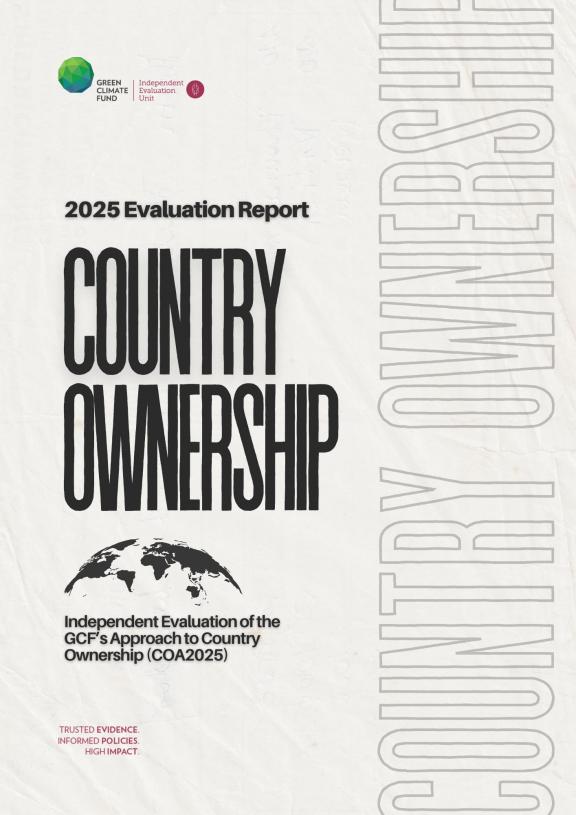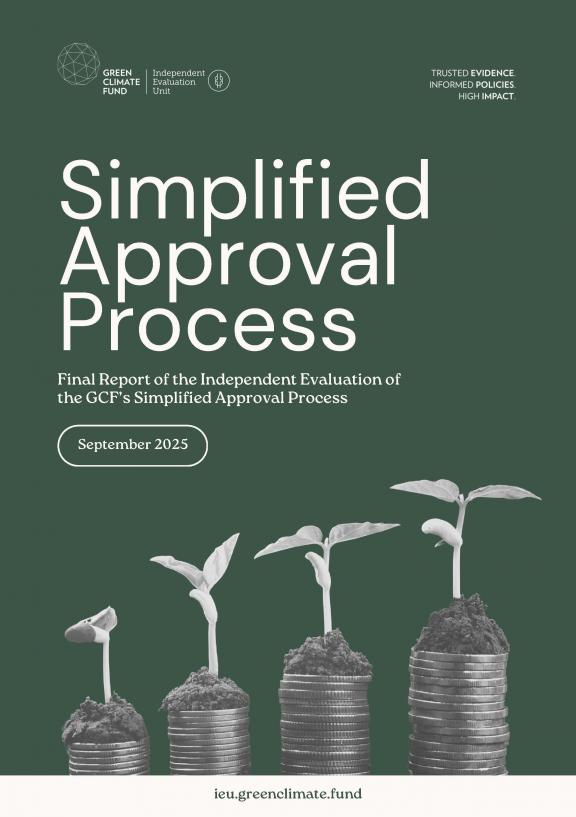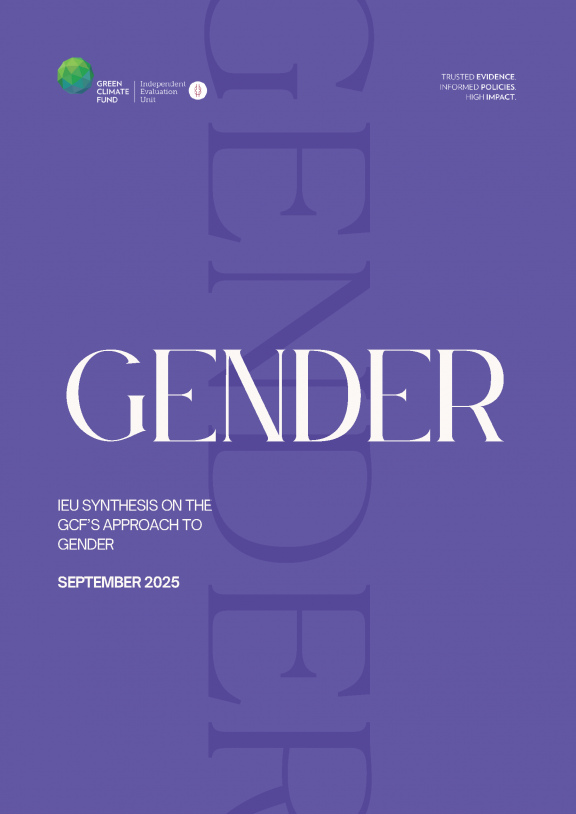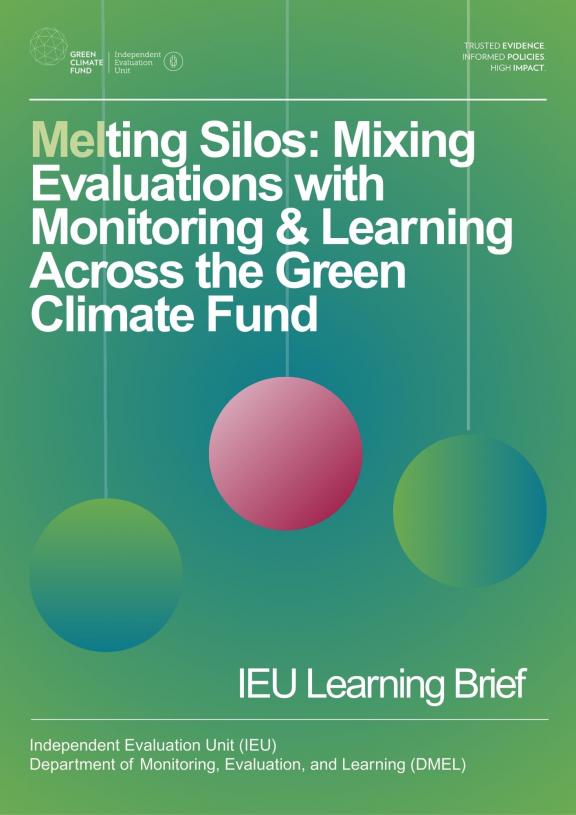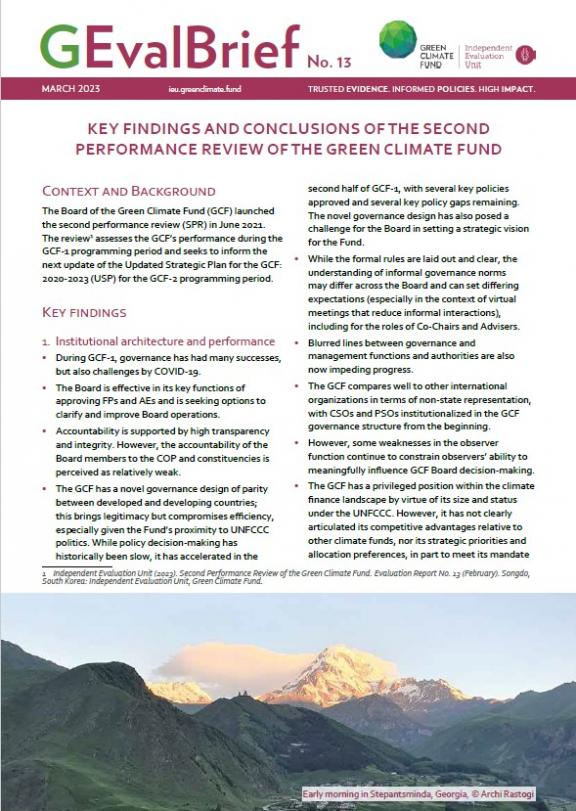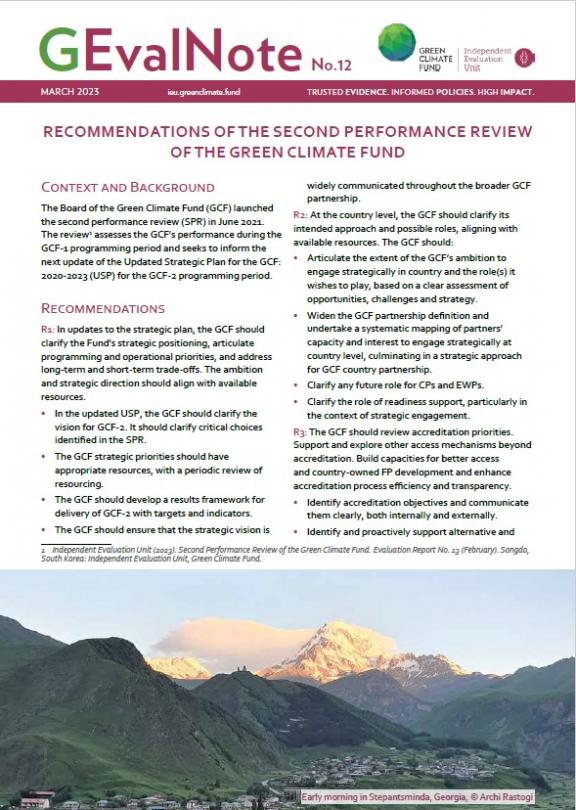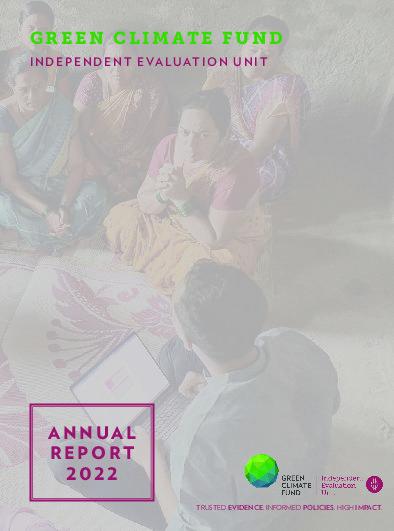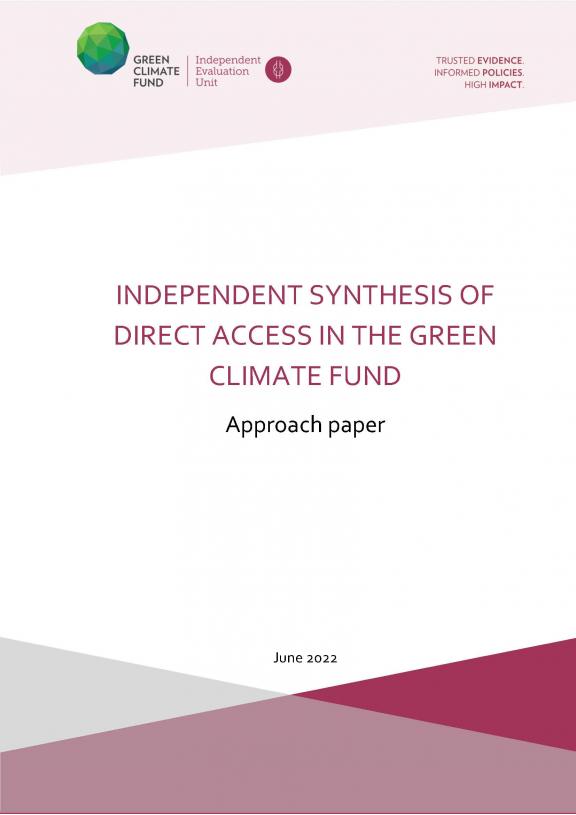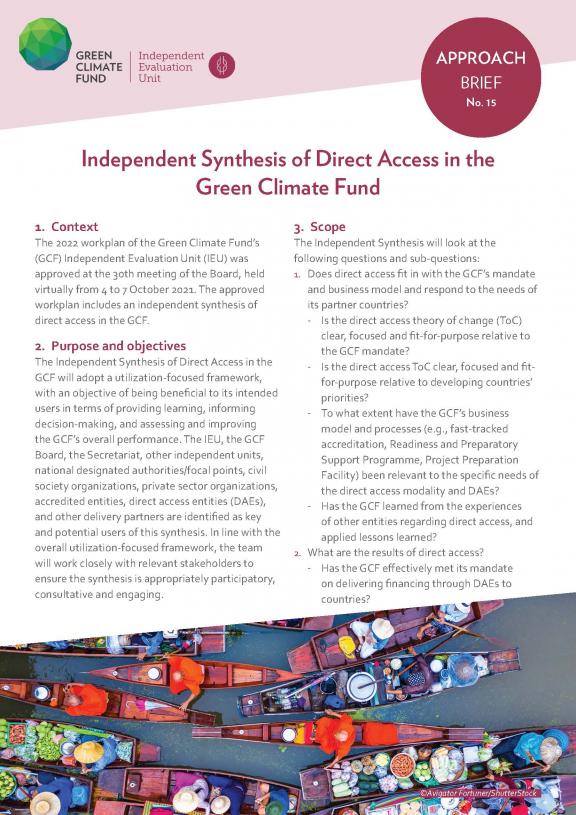IEU publications
To serve the needs of our stakeholders, the IEU issues a variety of publications related to our work, including in the context of evaluations and learning. Keep up with the IEU’s latest publications here.
Featured publications
Independent Evaluation of the GCF's Approach to Country Ownership (COA2025)
This independent evaluation of the Green Climate Fund’s (GCF) approach to country ownership was approved by the GCF Board as part of the 2025 workplan of the Independent Evaluation Unit (IEU) and is submitted in time for its forty-third meeting (B
Independent Evaluation of the GCF’s Simplified Approval Process (SAP2025)
The Green Climate Fund’s Simplified Approval Process (SAP) was created to make climate finance more accessible and responsive, thus enabling smaller, lower-risk projects to address urgent climate needs in vulnerable countries.
Independent Synthesis of the GCF’s Gender Approach
Approved at the fortieth meeting of the GCF Board (B.40), this formative Gender Synthesis consolidates insights from past evaluations, assessments, and studies to inform the forthcoming Independent Evaluation of the GCF’s Gender Approach.
MELting Silos: Mixing Evaluations with Monitoring & Learning Across the Green Climate Fund
This IEU Learning Brief, prepared jointly by the Independent Evaluation Unit (IEU) and the Department of Monitoring, Evaluation, and Learning (DMEL), examines how the Green Climate Fund (GCF) can better align its monitoring, evaluation, and learni
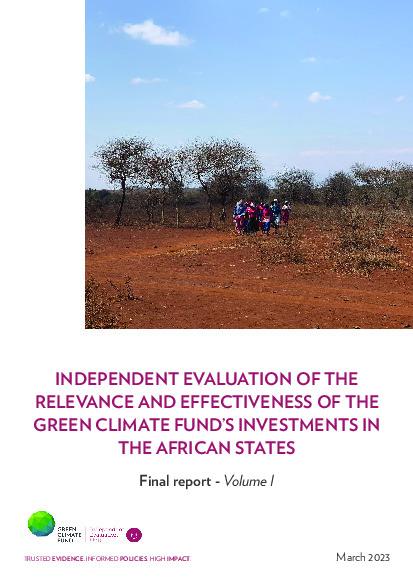
Final Report of the Independent Evaluation of the Relevance and Effectiveness of the Green Climate Fund's Investments in the African States
February 2023
This independent evaluation assesses whether the GCF’s approach and investments in the African States have been effective in promoting a paradigm shift towards low-emission and climate-resilient development pathways. It examines how the GCF’s approach and investments in the African states are relevant to meet the continent’s needs, whether they have been effective in reducing the vulnerability of local communities and their livelihoods and whether these impacts are likely to be sustained.
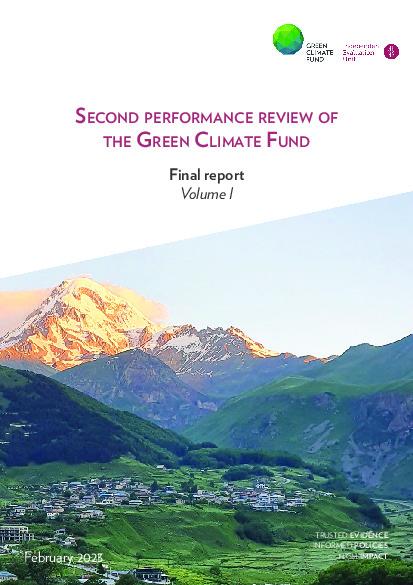
Final report of the Second Performance Review of the Green Climate Fund
February 2023
The Second Performance Review of the Green Climate Fund covers the GCF-1 period and seeks to inform, among other things, the next update to the strategic plan (USP-2), currently being discussed for the GCF-2 period (2024–2027). The scope of the SPR includes (1) evaluating the GCF’s progress in delivering on its mandate as set out in the GI and its strategic and operational priorities and actions as outlined in the USP, and (2) the performance of the GCF in promoting a paradigm shift towards low...

Final report of the Independent Synthesis of Direct Access in the Green Climate Fund
February 2023
The synthesis of Direct Access in the Green Climate Fund was conducted to assess and provide learning on the Fund’s implementation of the direct access concept and approach and to improve the relevance and performance of the GCF’s direct access modality as a way of accessing financing from the Fund. This independent synthesis used a utilization-focused framework, with the objective of being beneficial to its intended users in terms of providing learning, informing decision-making, and assessing...
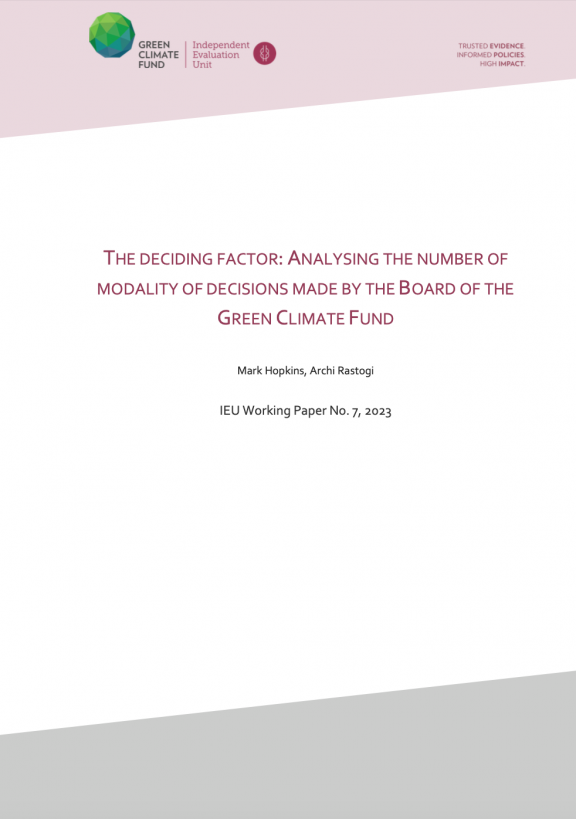
The Deciding Factor: Analyzing the Number and Modality of Decisions Made by the Board of the Green Climate Fund
January 2023
This paper analyses the nature and quantity of decisions made by the Board of the GCF during 2020 and 2021. The paper aims to illustrate the mechanics of the decision-making of the Board that will aid assessment of the effectiveness and efficiency of the GCF’s governance.
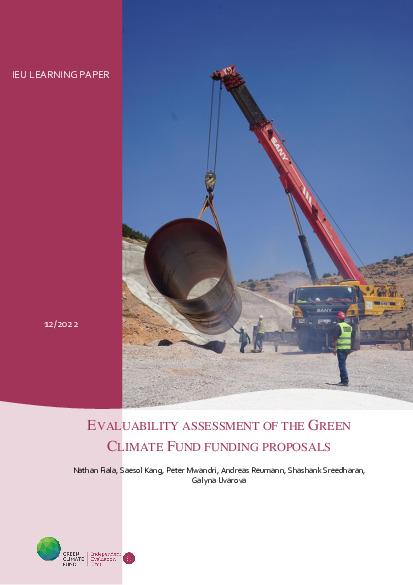
Evaluability assessment of the Green Climate Fund funding proposals
December 2022
This paper continues IEU’s effort to assess the tools and frameworks within funding proposals that enable robust monitoring and measurement of results during project implementation. The series began in 2019 with “Becoming bigger, better, smarter: A summary of the evaluability of Green Climate Fund proposals”. This paper presents the progress in the ability of projects to deliver a cost-effective impact on climate adaptation and mitigation during the GCF-1 period.
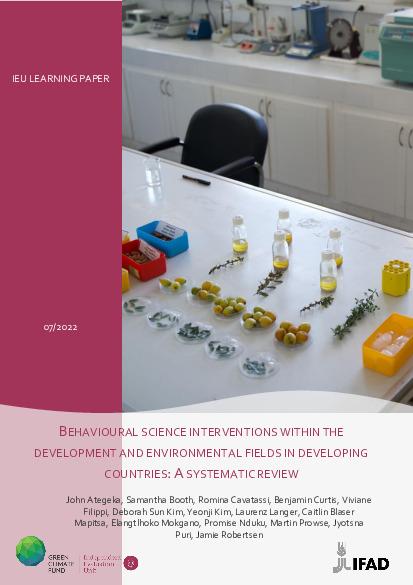
Systematic review: Behavioural science interventions within the development and environmental fields in developing countries
December 2022
This paper presents a systematic review on behavioural science interventions in the human development and environmental/climate fields in developing countries. The review synthesizes evidence on five specific behavioural interventions – feedback, reminders, salience (communication), salience (experience design), and goal setting – and how these influence development and environmental/climate outcomes. It aims to facilitate the use of evidence in informing policy and practice decisions within...
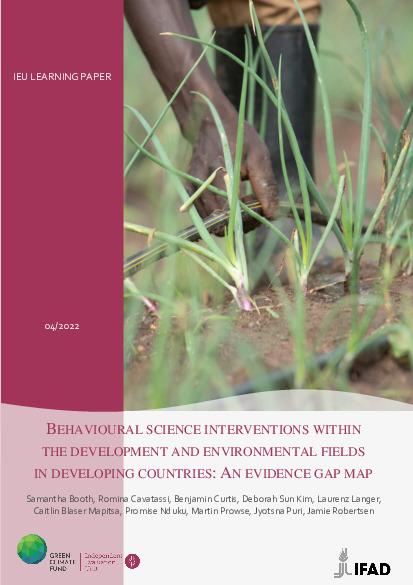
Evidence gap map: Behavioural science interventions within the development and environmental fields in developing countries
December 2022
The evidence gap map (EGM) presents a report and online resource depicting the landscape of studies on the effectiveness of behavioural science interventions. It finds the most commonly evaluated interventions are reminders and feedback. Most studies are from the WASH, financial, energy/extractives, and agricultural sector. Studies report adaptation outcomes more frequently than on mitigation, especially regarding knowledge, uptake and use.
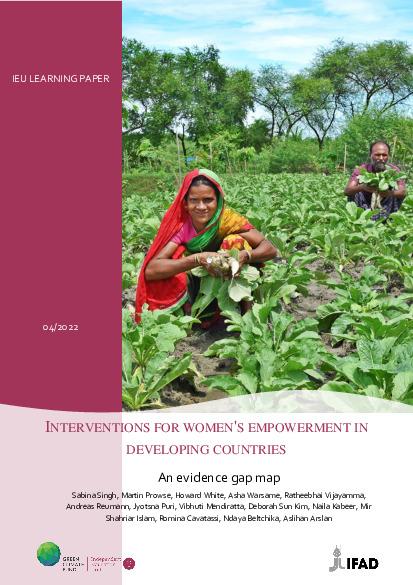
Evidence gap map: Interventions for women's empowerment in developing countries
December 2022
This evidence gap map plots studies on the effectiveness of interventions for women’s empowerment in developing countries. The evidence gap map shows most evidence is from Sub-Saharan Africa and South Asia, especially on economic interventions and capacity-building interventions. It serves as a useful visual resource to understand the areas where research on the effectiveness of interventions for women’s empowerment is concentrated and where it is lacking.

Systematic review: Effectiveness of life skills training interventions for the empowerment of women in developing countries
December 2022
The systematic review evaluates the ability of life skills interventions to promote the empowerment of women of all ages. Overall, life skills positively affect a range of self, social and economic empowerment outcomes. Small but significant positive changes were detected for a range of outcome areas including leadership, attitudes to gender issues, sexual and reproductive health and rights, employment and life skills themselves.
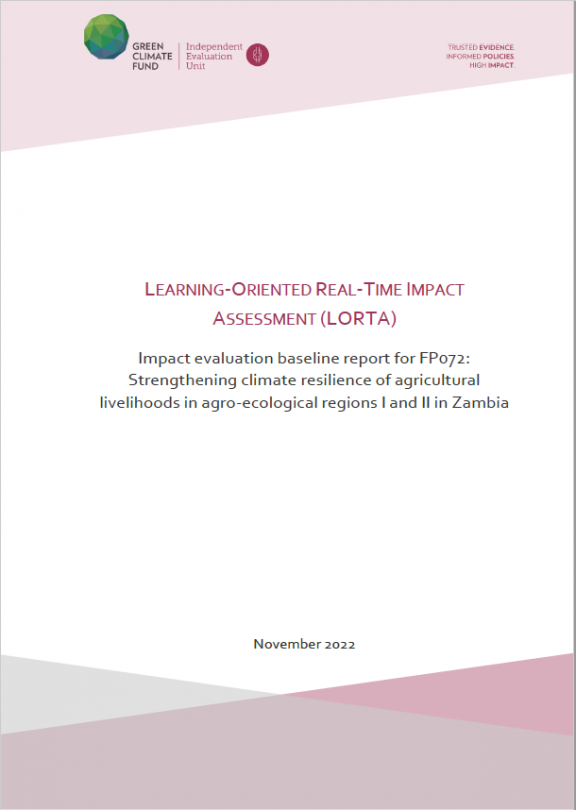
Impact evaluation baseline report for FP072: Strengthening climate resilience of agricultural livelihoods in agro-ecological regions I and II in Zambia
November 2022
This report presents the baseline data for “Strengthening climate resilience of agricultural livelihoods in agro-ecological regions I and II in Zambia” (SCRALA), a project funded by the Green Climate Fund and implemented by the United Nations Development Programme in Zambia. The report includes descriptive statistics collected for the baseline phase of the SCRALA impact evaluation.
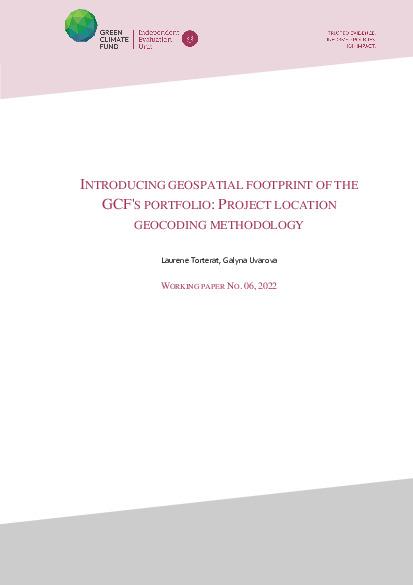
Introducing geospatial footprint of the GCF's portfolio: Project location geocoding methodology
October 2022
This paper summarizes how the IEU DataLab identifies the sub-national geographical location of GCF projects by reviewing their approved funding proposals. The methodology described in this paper marks the first time the GCF’s climate finance flows and distribution have been tracked at the sub-national level.
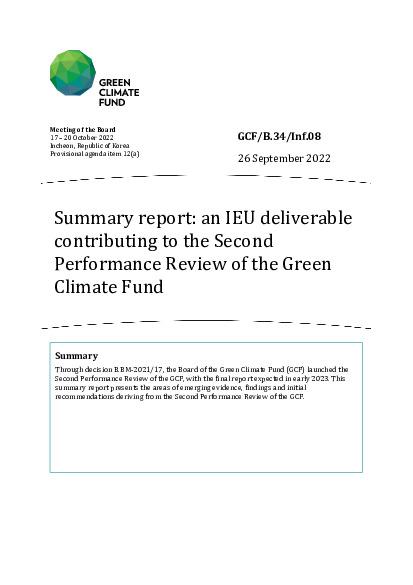
Summary report: an IEU deliverable contributing to the Second Performance Review of the Green Climate Fund
September 2022
Through decision B.BM-2021/17, the Board of the Green Climate Fund (GCF) launched the Second Performance Review of the GCF, with the final report expected in early 2023. This summary report presents the areas of emerging evidence, findings and initial recommendations deriving from the Second Performance Review of the GCF.

IEU Flyer 2022
June 2022
The IEU updated its publications flyer in May 2022 to showcase some of the IEU's most recent activities and products. The IEU delegation to the 14th Biennial Conference of the European Evaluation Society distributed this flyer to other conference participants. The IEU will continue to update this flyer and utilize it to disseminate its work.
